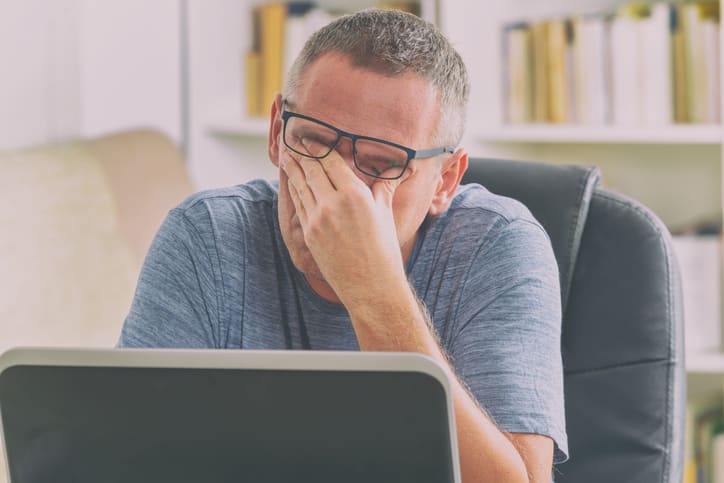-
What Causes Itchy Eyes and Eyelids — and How to Get Relief

Why are your eyes itching? More importantly, what can you do about it? Itchy eyes can make a person feel frantic, and when you’re eyes itch, it’s hard to concentrate on anything else. Rubbing your eyes is an almost irresistible urge, but it’s a bad idea because it can make things worse and sometimes even cause a corneal abrasion. There are better ways to handle the problem, so here, we give you the run-down on itchy eyes and eyelids.
What makes eyes itch, anyway? Most of the time, it’s allergies. Some sort of allergen causes your body to release histamines into the tissues around the eyes, and you’re left with itching, redness, and swelling. The allergen might be pollen, dust, or animal dander, and seasonal allergies can cause allergic conjunctivitis in the spring when outdoor allergens like grass and weeds are in full force. Things like mold and dust, though, cause allergic reactions all year long. Sometimes, the culprit is a product you’re using, like contact lens solution, makeup, lotions, soaps, or even artificial tears.
Allergies aren’t the only thing that might be making your eyes itch, though. Some people find that dry eye syndrome or Meibomian gland dysfunction cause both itching and burning. If your eyes are red and inflamed, the cause might be an inflammatory condition called blepharitis, caused by bacteria or microscopic mites. Sometimes, something as simple as wearing your contact lenses too long can cause your eyes to itch.
Because there are so many reasons for eyes to itch, it’s smart to see an eye doctor to determine the cause. Often, though, itchy eyes can be treated without using medicines. Placing cold compresses over the eyes can bring relief within just a few minutes, and you can repeat this process as often as you need to do so. Sometimes artificial tears can be used to treat eye allergies because they wash the allergens out of the eyes. Keeping the bottle of artificial tears in the refrigerator can make them particularly soothing to burning, itching eyes. Allergy medications, both in oral form and eye drops, can help if your problem is an allergen.
In many cases, your doctor will need to prescribe eye drops or oral medications to treat your itchy eyes and eyelids. It’s important to follow your doctor’s advice, and use the right kind of treatment for your particular condition. The good news? Some medications can make you less prone to having itchy eyes in the future.
If you are looking for an eye doctor, the Gerstein Eye Institute in Chicago can help. Since 1968, the Gerstein Eye Institute has been providing exceptional ophthalmologic care to patients in the Chicago area. With decades of experience in ophthalmology, our certified professional staff members work hard to provide the kind of personalized care that keeps patients coming back year after year, eventually entrusting the eye health of their children and grandchildren to us as well. To schedule an appointment, call us at (773) 973-3223 or contact us through our website.
-
How to Know if a Painful Eye is an Emergency

When your eye hurts, it’s hard to think of anything else. Whether it’s an itching, burning, shooting pain on the surface of your eye, or a deeper, throbbing pain inside your eye, eye pain can be excruciating and hard to manage. Should you see a doctor? Is it time to go to the emergency room? If the pain is severe enough, or if you’ve lost vision, the answer may be yes. Here’s how to know whether your painful eye is an emergency.
What can cause a painful eye? It could be allergies, illness, injury, infection, or a foreign body in the eye. Symptoms vary, but if you have any of the following symptoms, you should consider calling for an appointment with an eye doctor.
- Eye pain
- Redness
- Irritation caused by contact lenses
- Discharge
- Eye injury
- Welder’s burn
- Swelling or puffiness
- Styes
Sometimes, though a painful eye is too severe to allow you to wait for a doctor’s appointment. Trying to wait it out could cause the problem to get worse, and might even result in a loss of vision. Seek emergency medical care as soon as possible if you have any of the following symptoms.
- Unusually severe eye pain, especially if it’s accompanied by a headache, fever, or sensitivity to light
- A sudden change in vision
- Eye pain with nausea or vomiting
- A foreign object or chemical in your eye
- Halos around lights
- Trouble moving your eye or an inability to keep it open
- Blood or pus coming from your eyes
If you have an eye emergency, and it’s after regular office hours, you may have no choice but to go to the emergency room. If you can catch the problem before offices close, though, it’s a much better idea to see an eye doctor. Emergency rooms don’t always have the right equipment for examining the eyes, and they might not have doctors or nurses who specialize in caring for eyes. Because a misdiagnosis could potentially result in vision loss, and because you’ll probably be given a referral to an eye doctor anyway, it’s typically better to skip the ER and go straight to an ophthalmologist or optometrist.
Even if it’s after hours, if you call your eye doctor there may be information available, either in a recorded message or through the doctors’ answering service, about where to seek emergency eye care. There are situations, though, in which an emergency room trip is warranted. If you’re injured in other places in addition to the eye, if your eye has been impaled, if you are bleeding from the eyes, or if you’ve had a head trauma, it’s smart to head to the ER. What you should never do is try to treat painful eye conditions on your own, without the benefit of medical advice.
If you are looking for an eye doctor, the Gerstein Eye Institute in Chicago can help. Since 1968, the Gerstein Eye Institute has been providing exceptional ophthalmologic care to patients in the Chicago area. With decades of experience in ophthalmology, our certified professional staff members work hard to provide the kind of personalized care that keeps patients coming back year after year, eventually entrusting the eye health of their children and grandchildren to us as well. To schedule an appointment, call us at 773.596.9545 or contact us through our website.
